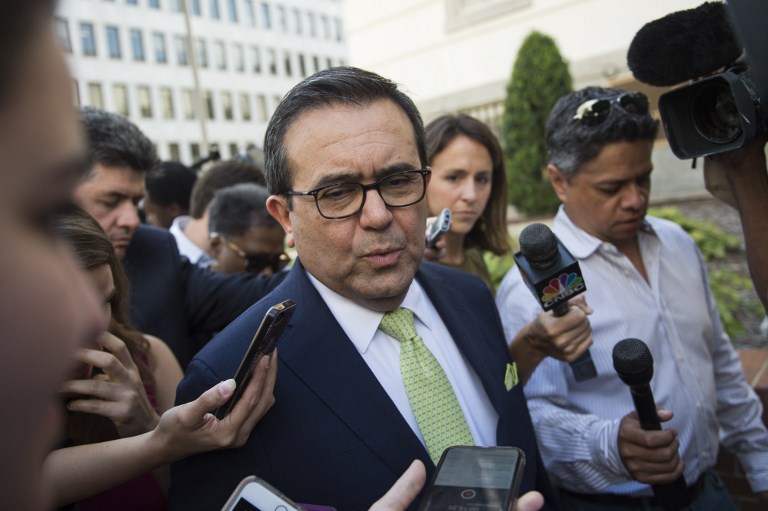
by Heather Scott
Agence France-Presse
WASHINGTON, United States (AFP) — Negotiations between the United States and Mexico to revise the nearly 25-year-old North American Free Trade agreement are making progress but will not be concluded this week, Mexico’s Economy Minister Ildefonso Guajardo said Thursday.
But a Chinese delegation, in Washington for talks aimed at defusing the spiraling US trade war with Beijing, left without any breakthrough.
NAFTA and China have been two key targets of US President Donald Trump’s aggressive trade strategy and he has largely brushed off concerns from the business community about the harm done to the US economy.
With NAFTA at least, there has been progress.
The negotiations “are well advanced,” Guajardo told reporters, but “we are not there yet.”
Canada needs to reengage in the talks before the NAFTA rewrite can be completed and “the only way that can happen is if we continue through the weekend and into next week,” he added.
Guajardo and Mexico’s Foreign Minister Luis Videgaray have been shuttling back and forth to Washington for more than a month for meetings with US Trade Representative Robert Lighthizer to try to iron out the bilateral issues, such as rules for the auto market, before the end of August.
Officials last week indicated they expected a breakthrough this week but “negotiations are highly complex,” Guajardo said on his way into yet another meeting.
He has cautioned that some of the hardest issues were still on the table, including the US demand for a five-year “sunset clause,” which would oblige the three countries to renew the pact regularly.
“There’s been no indication of flexibility from the US on this issue,” a senior Canadian official told AFP.
Canada’s top diplomat and chief NAFTA negotiator, Chrystia Freeland, said Wednesday she was encouraged by the progress and would rejoin the talks once Washington and Mexico City finish their bilateral discussions.
The three countries have been negotiating for a year to salvage the trade pact Trump says has been a “disaster” for the United States.
No breakthrough with China
As part of Trump’s aggressive trade stance, Washington hit China with 25 percent punitive duties on another $16 billion in goods starting Thursday, triggering a swift tit-for-tat retaliation from Beijing.
Adding to the $34 billion targeted in July, that brings the total two-way trade weighed down by the steep tariffs to $100 billion, and the United States currently is considering hitting another $200 billion — which Trump indicated could come very soon.
“We’ve put a $50 billion number out there. Now, the total number is $250 billion,” Trump said at the White House on Thursday. “And there’s a 25-percent tax on that, now, coming in…. Some of it starts in a week.”
Washington is accepting public comments on the $200 billion tariff tranche until September 6 but they could take effect soon after.
That is on top of US tariffs on Chinese appliances and solar panels, as well as steel and aluminum from around the world — a total of 10,000 products.
A China’s Vice Commerce Minister Wang Shouwen and Vice Finance Minister Liao Min concluded two days of talks with a US team lead by David Malpass, US Treasury under secretary for international affairs, the first trade discussions since June.
White House Deputy Press Secretary Lindsay Walters said the talks concluded after officials “exchanged views on how to achieve fairness, balance and reciprocity in the economic relationship.”
Economic damage
US businesses have become increasingly concerned about the exchange of tariffs, which are raising prices for manufacturers and hurting US consumers and farmers.
But Trump has been unapologetic, insisting that his tough tactics will work.
Federal Reserve officials warn escalating trade disputes are “a potentially consequential downside risk” for the economy, possibly fueling inflation and impeding investment.
S&P Global Ratings on Thursday downgraded motorcycle maker Harley Davidson’s debt rating, citing retaliatory tariffs among other “headwinds” facing the company.
And National Retail Federation Vice President Jonathan Gold said the tariffs “threaten to increase costs for American families and destroy the livelihoods of US workers.”
China’s Commerce Ministry said Thursday the country “firmly opposes the tariffs and has no choice but to continue to make the necessary counter-attacks.”
US Commerce Secretary Wilbur Ross said China would not be able to continue to retaliate at the same pace as the United States, since “we have many more bullets than they do.”
However, Beijing also could target the local operations of US corporations with inspections and boycotts as it has done in past disputes with South Korea and Japan.







